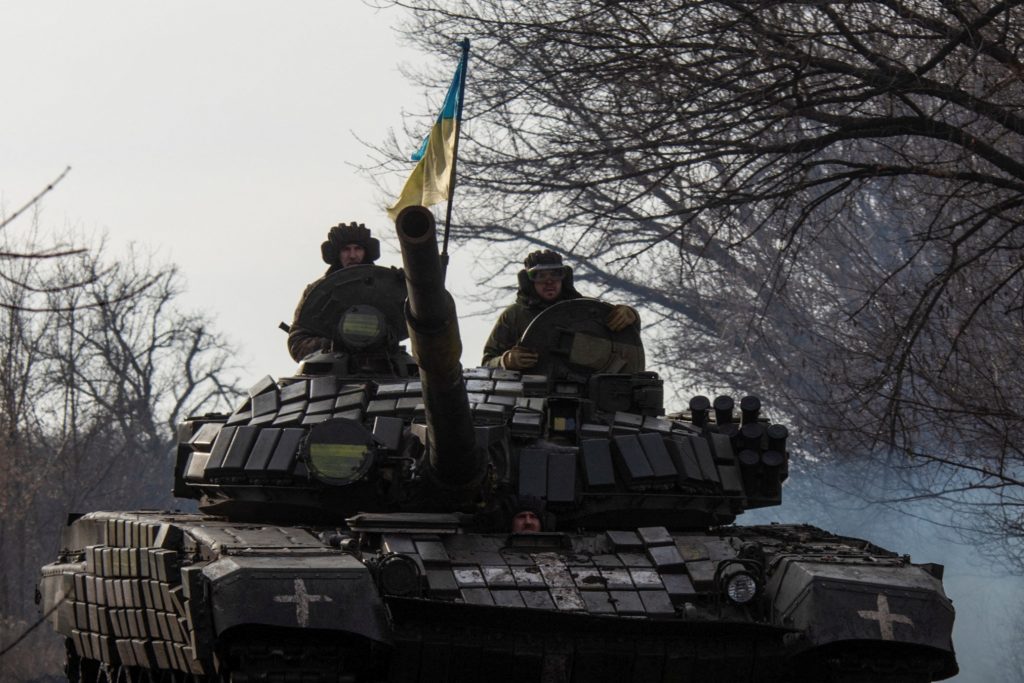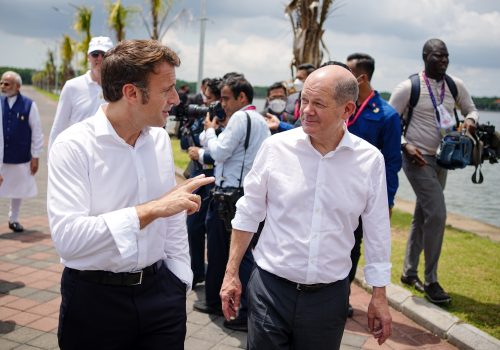Human-rights lawyer Oleksandra Matviichuk, whose Center for Civil Liberties won the Nobel Peace Prize last year, had an unsettling message for global elites here in Davos: Only more modern weaponry can deliver peace and human rights to Ukraine.
And Ukraine’s allies must send them fast!
Speaking to the Davos crowd virtually in a conversation with Harvard Professor Graham Allison, who was once his student, former US Secretary of State (and Atlantic Council board member) Henry Kissinger reversed his years-long opposition to Ukraine joining NATO, embracing membership as an “appropriate outcome” of Russian President Vladimir Putin’s war, which has left no room for Ukraine’s neutrality.
“My feeling is we are at a crucial moment in the conflict when the momentum could shift in favor of Russia if we don’t act decisively and quickly,” former US Senator Rob Portman told me after a public session at the Palantir Pavilion. “A surge is needed.”
Portman detailed what that should include: more effective weapons and training, longer-range missiles, more Patriot missile systems and air defense—including coordination with Poland and Slovakia to use their Patriots along Ukraine’s borders to provide an umbrella for Western Ukraine—Abrams tanks, and F-16s. Another part of the surge, he says, should include sanctions and export controls in coordination with the European Union.
Perhaps the most surprising aspect of the World Economic Forum’s (WEF) annual Davos meeting, which ended on Friday, was the extent and nature of its focus on Ukraine. Even more notable was the growing number of voices recognizing the danger of Putin’s war to the global system of rules and institutions, and thus embracing greater support for Ukraine.
To be sure, there wasn’t any consensus about that. Senior officials representing governments of what has become known as the “Global South” complained about all the emphasis on military means, reminding Americans in particular of their miscues in Iraq and Afghanistan. Others said they regard addressing climate change and economic inequality as higher global priorities.
It’s not surprising that this year’s Davos theme was “cooperation in a fragmented world.” The world remains divided around a vast number of issues, and while roughly forty countries have joined sanctions against Putin and Russia over the Ukraine war, around 140 have not. That said, the recognition has grown even among fence-sitters that evidence of Putin’s war crimes is accumulating and that his imposition of the rule-of-the-jungle in Ukraine, if not addressed, endangers the rule-of-law worldwide.
That brings me back to Portman’s concept of a Ukraine surge, replacing the habit of incremental increases in support that have preceded it. That approach makes sense for a number of reasons.
It recognizes that more effective and longer-range weaponry is all that will allow Ukraine to protect its population and eliminate the “sanctuary” provided to the Russian bases from which it is being targeted. The surge approach also recognizes that the current policy of incremental change could face the growing dangers of Western funding fatigue.
Most of all, it acknowledges that a longer war of attrition favors Moscow. Though Putin’s military lacks the quality of Ukraine’s defense technology, intelligence, and morale, it may be able to offset that over time with the quantity of soldiers and weapons it can throw at the war. Moscow’s current mobilization will soon bring tens of thousands of new soldiers to the front lines.
The most compelling argument against a surge has been that it would provoke a response from Putin, up to and including the use of tactical nuclear weapons. US President Joe Biden, whose military and political support for Ukraine has been significant and consistent, has nevertheless spoken of his desire to avoid World War III when explaining why he hasn’t done even more.
However, as Eric Schlosser argues in the Atlantic this week, “the greatest nuclear threat we face is a Russian victory in Ukraine.”
Schlosser complains that concerns about Russia’s nuclear weapons have deterred the United States and its allies from providing Ukraine with the wherewithal that could change the course of the war. “If nuclear threats or the actual use of nuclear weapons leads to the defeat of Ukraine,” he writes, “Russia may use them to coerce other states. Tactics once considered immoral and unthinkable might become commonplace.”
It was a remarkable fact that Henry Kissinger, at age ninety-nine, was the geopolitical voice most quoted on Davos’s snowy streets this week.
He warned against the “destruction of Russia as a state,” which he feared would “open up the vast area of its eleven time zones to internal conflict and to outside intervention at the time when there are fifteen thousand and more nuclear weapons on its territory.”
At the same time, he praised the United States, its allies, and Ukraine for demonstrating “that a conventional attack from Russia on Europe will find united resistance and that Russia probably does not have the capacity to overcome it by conventional means.”
Second, he said NATO’s plan to expand to Finland and Sweden had achieved a significant strategic objective. Beyond that, Kissinger argued that the United States should, “if necessary, intensify its military support” for Ukraine until a settlement can be reached.
Kissinger revisited his long-standing hope of providing Russia “an opportunity to rejoin an international system,” but he introduced a new wrinkle in his thinking. His suggestion was that Russia’s unhappy war experience may cause it to “reevaluate its historic position” of military overreliance, distance from Europe, and fears of domination by Europe.
I’m tempted to read this between Kissinger’s lines: Putin’s defeat would also be the best outcome for Russians who want to escape counterproductive, historical patterns and join the community of civilized nations.
“I am happy that Kissinger changed his mind” about Ukraine’s NATO membership, Ukrainian President Volodymyr Zelenskyy said in his own WEF session.
As for Kissinger’s desire to ensure Russia’s international place, Zelenskyy countered, “I think Russia has earned a place among terrorists… They have to open their eyes if they want to see the future of their Russian civilization. They have to recognize their own mistakes… They will have to respect our territorial integrity.”
To achieve that outcome, let the surge begin.
Frederick Kempe is president and chief executive officer of the Atlantic Council. You can follow him on Twitter @FredKempe.
THE WEEK’S TOP READS
#1 The Greatest Nuclear Threat We Face Is a Russian Victory
Eric Schlosser | ATLANTIC
In this powerful piece, Eric Schlosser makes clear the stakes in Ukraine. If Putin is victorious, it will teach him, and the world, the dangerous lesson that nuclear blackmail works.
The arguments Russian propaganda makes, Schlosser writes, “are based on lies. They are being spread to justify Russia’s unprecedented use of nuclear blackmail to seize territory from a neighboring state.”
Schlosser continues, “concerns about a possible nuclear exchange have thus far deterred the United States and NATO from providing Ukraine with the tanks, aircraft, and long-range missiles that might change the course of the war. If nuclear threats or the actual use of nuclear weapons leads to the defeat of Ukraine, Russia may use them to coerce other states. Tactics once considered immoral and unthinkable might become commonplace. Nuclear weapons would no longer be regarded solely as a deterrent of last resort; the nine countries that possess them would gain even greater influence; countries that lack them would seek to obtain them; and the global risk of devastating wars would increase exponentially.” Read more →
#2 The Sanctions on Russia Are Working
Vladimir Milov | FOREIGN AFFAIRS
For those who argue that sanctions on Russia have failed, former Russian Deputy Energy Minister Vladimir Milov shows how Putin relies on massaged data and projections to conceal the truth.
“Russian figures showing manageable levels of inflation are also misleading,” Milov writes. “Even the Russian central bank currently reports that observed inflation—that is, how the public views the increase in prices, as reported in surveys—to be 16 percent, or over four percentage points higher than the official statistic, which is a little less than 12 percent.”
“According to a poll released by the private Russian research company Romir in October 2022,” Milov continues, “68 percent of Russians had noticed a reduction in the supply of goods offered in stores over the past three months. According to the Russian Public Opinion Research Center, 35 percent of Russians were forced to cut their spending on food in 2022. The Public Opinion Foundation, a Russian polling organization, reported in December 2022 that only 23 percent of Russians considered their personal financial situation to be ‘good.’” Read more →
#3 Oil price cap and falling cost of crude worry Kremlin
Anastasia Stognei | FINANCIAL TIMES
For further evidence of the toll Western sanctions are taking on Russia, read this excellent FT report.
“With oil prices falling and the costs of the war widening Russia’s deficit last year to 2.3 percent of gross domestic product,” Anastasia Stognei reports, “Putin and his officials see financial risks ahead. ‘You need to look at this discount so that it does not create any budget problems. Discuss it and deliver your proposals,’ he told officials last week after Alexander Novak, deputy prime minister, admitted the crude discounts were ‘the main risk.’”
All the more reason to keep the pressure on. Read more →
#4 The America trap: Why our enemies often underestimate us
Rober Kagan | WASHINTON POST
In this brilliant essay adapted from his new book, Robert Kagan explains how the United States’ reluctance to involve itself in foreign conflicts lulled Nazi Germany, fascist Italy, and imperial Japan into a false sense of security.
“Hitler fell into a trap unwittingly laid by American policymakers, Congress and the public,” he writes. “In the critical years of his rise to power, the consolidation of his rule, Hitler feared and expected the democracies would come after him during what he called that ‘perilous interval.’”
“When they did not, and he was allowed to pass undisturbed through his time of greatest vulnerability, he grew overconfident. As early as 1935, Hitler and his lieutenants were already ‘absolutely drunk with power,’ convinced that ‘the whole world’ was afraid of them and would not move against them ‘no matter what’ they did. He was emboldened to reoccupy the Rhineland in 1936 and then to move on to fulfill his ambitions in central Europe. When Roosevelt took office, it was already too late to knock Hitler off his course merely with strong words or even sanctions. By the time Roosevelt actually began trying to convince Americans that they would have to become involved in the general international crisis, both Hitler and the Japanese were so far down the road that they could not be deterred by anything short of a genuine threat of war, and perhaps not even by that.”
Read this piece. Check out the book: The Ghost at the Feast: America and the Collapse of the World Order, 1900-1941. Read more →
#5 A Conversation with Henry Kissinger: Historical Perspectives on War
Henry Kissinger and Graham Allison | WORLD ECONOMIC FORUM
Henry Kissinger, who at age ninety-nine is still the world’s premier strategic thinker, spoke to his former student Graham Allison in a Davos conversation, which is worth listening to in its entirety.
“Before this war,” Kissinger said, “I was opposed to membership of Ukraine in NATO because I feared that it would start exactly the process that we have seen now. Now that this process has reached its level, the idea of a neutral Ukraine under these conditions is no longer meaningful. And at the end of the process that I described, it ought to be guaranteed by NATO in whatever forms NATO can develop. But I believe Ukrainian membership in NATO would be an appropriate outcome.”
Amen. Read more →
Atlantic Council top reads
Image: Ukrainian servicemen ride atop a tank near the frontline town of Bakhmut, amid Russia's attack on Ukraine, in Donetsk region, Ukraine January 20, 2023. REUTERS/Oleksandr Ratushniak



